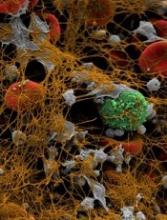The European Medicines Agency’s Committee for Medicinal Products for Human Use (CHMP) has reiterated its negative opinion of betrixaban.
Once again, the CHMP has concluded that it cannot recommend approval of betrixaban for the prevention of venous thromboembolism (VTE) in adults hospitalized for an acute medical illness with risk factors for VTE, including VTE-related death.
The CHMP previously issued a negative opinion of betrixaban in March, but Portola Pharmaceuticals, Inc., requested a re-examination of that opinion.
The CHMP agreed to re-examine the opinion and confirmed the refusal of the marketing authorization on July 26.
The marketing authorization application for betrixaban was supported by data from the phase 3 APEX study. In this trial, researchers compared oral betrixaban to injectable enoxaparin for the prevention of VTE in patients with acute medical illnesses.
The CHMP said APEX did not satisfactorily show betrixaban’s effectiveness when used for preventing VTE in patients admitted to the hospital for recent medical illness.
In addition, patients treated with betrixaban had more episodes of bleeding than patients who received enoxaparin.
The CHMP said the excess bleeding was an important concern because betrixaban was expected to be used in patients with serious underlying conditions for whom any episode of bleeding could have serious consequences, and betrixaban’s long persistence in the body could complicate management of bleeding.
Overall, the CHMP said the benefits of betrixaban did not outweigh its risks.
Portola said this decision will not affect patients currently enrolled in clinical trials of betrixaban.
The company also said it will continue working with regulatory authorities in countries outside the European Union to potentially bring betrixaban to patients as quickly as possible.
“We are disappointed by the committee’s assessment given both the unmet need and the clinically meaningful outcomes of the APEX trial in reducing VTE and VTE-related deaths in a vulnerable patient population,” said John T. Curnutte, MD, PhD, interim co-president and head of research and development for Portola.
“We remain confident in the potential public health impact of betrixaban and will maintain focus on the US commercial launch as we continue to work toward our goal of expanding patient access to betrixaban around the world.”
Betrixaban was approved in the US in June 2017 under the trade name Bevyxxa.


